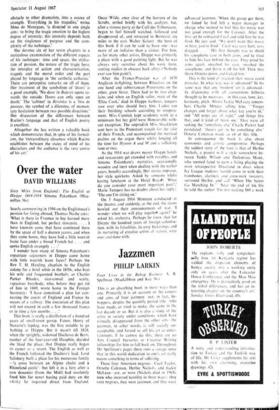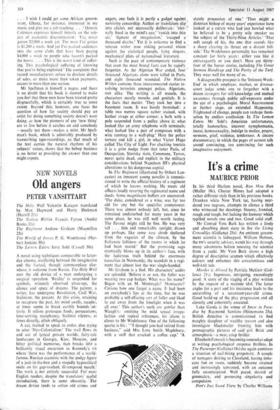Jazzmen
PHILIP LARKIN
This is an absorbing book in more ways than tine. Primarily it is an account of the careers and aims of four jazzmen--not, in fact, be- boppers, despite the quaintly period title -who have made, or tried to make, the scene in the last decade or so. But it is also a study of the artist in society under conditions which have virtually disappeared from the other arts --the jazzman, in other words, is still socially un- acceptable, and forced to sell his art as enter- tainment; if he cannot do this, there are no Arts Council bursaries or Creative Writing fellowships for him to fall back on. Throughout Mr Spellman's pages there runs a savage sense that in this world dedication to one's art really means something in terms of suffering.
These four American negroes—Cecil Taylor. Ornette Coleman, Herbie Nichols, and Jackie McLean—are, or were (Nichols died in 1963), men who incurred hostility in three ways: they were negroes, they were jazzmen. and they were ad‘ranced jazzmen. 'When the group got there, we fotind he had left a negro manager in charge who seemed to feel that his music was not good enough for the Coronet. After the first set he contacted Cecil and told him he was fired. He just said. "We don't want this music in here, you're fired.- Cecil was very hurt, very
dragged. . 'His first thought was to shield his saxophone case in both arms, and he tried to hide his face behind the case. They pried his arms apart, smashed his ease, smashed the saxophone, and threw it off the hill. l'hen they threw Ornette down, and kicked him.'
This is the kind of reaction their music could provoke. In what way was it advanced? In the same way that any 'modern' art is advanced: by dispensing with all conventions hitherto thought to be necessar■ in this case, tune, key, harmony, pitch. Altoist Jackie McLeary remem- bers Charlie Mingus telling him, "'Forget changes and forget about what key you're in;" and "All notes are all right," and things like that, and it kind of threw me. They were all seeking the 'something else' Charle Parker had postulated; 'there's got to be something else.' Ornette Coleman made an LP of this title.
In consequence the hook is also about economics and artistic compromise. Perhaps the saddest story of the four is that of Herbie Nichols, a pianist with a style somewhere .be- tween Teddy Wilson and Thelonious Monk, who seemed fated to earn a living playing the most retrospective Dixieland in dives where Ivy League students 'would come in with their trombones, clarinets and crew-neck sweaters, surround Herbie, and call "When The Saints Go Marching In."' Near the end of his life he told the author not making $60 a week . . . I wish I could get some African govern- ment, Ghana, for instance, interested in my music and give me a job teaching. . . Ornette Coleman expresses himself bitterly on the sub- ject Of economic discrimination: Tve: never gotten $2,000 a week yet. The most l've.gotten is $1,200 a week. And yet I've packed audiences into the same clubs that have been paying $4,000 a week to people who haven't packed the house This is the worst kind of suffer- ing. This psychological suffering of knowing that you're being exploited.' The complaint that record manufacturers refuse to disclose details of sales, or make more than token payments, occurs in more than one section.
Mr Spellman is himself a negro, and there is no doubt that his book is slanted to make you feel that these men have been treated pretty disgracefully, which is certainly true to some extent. Beyond this, however, one faces the question of how far society should pay an artist for doing something society doesn't want doing, or how the pioneers of any 'new thing' are to live before it catches on and somebody —usually not them—makes a mint. Mr Spell- man's book, which is admirably produced by transcribing tape-recordings, so that much of the text carries the natural rhythms of his subjects' voices, shows that the bebop business is no better at providing the answer than one might expect.































 Previous page
Previous page